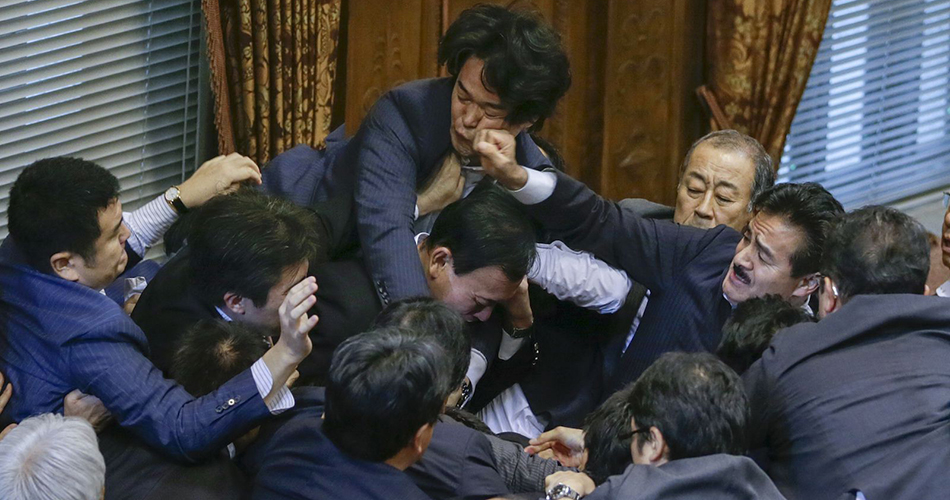


On September 17th, 2015, viewers of Japan’s national television channel witnessed a ridiculous sight in the Japanese government’s committee chamber. In a matter of seconds, an onslaught of Japanese legislators hurled themselves atop the desk of the committee chairman to prevent him from proceeding with the vote on a bill granting Japan more power to exercise their previously strictly limited military power. In spite of Prime Minister Shinzo Abe’s ongoing efforts to prime the public to support his call for a more “assertive” Japanese military, it seems the overwhelming doubts extend even into the government.
To be clear, what has been passed is a re-interpretation of Article 9 from the post-war constitution. Drafted in 1947, Article 9 induces Japan to “forever renounce war as a sovereign right of the nation,” and to relinquish the right to “land, sea, and air forces, as well as other war potential.” However, it does allow its currently existing Japanese Self-Defense Force (SDF) to exist solely for the sake of protecting the Japanese homeland (though this original interpretation has incited a few cries of unconstitutionality).
More recently, the second clause of Article 9 on self-defense has been reinterpreted to allow participation in “collective self-defense.” But what do these three words, when put together, really mean? To name a few possibilities now viable under the new interpretation of Article 9, the SDF can now help allies at war, shoot down missiles aimed at the U.S., keep sea lanes secure, join U.N.-backed humanitarian missions, and even help with rescuing hostages with the help of its military.
There seem to be some potential benefits, but these revelations either haven’t reached the ears of Japan’s public or bear no consideration in relation to Japan’s history of pacifism: overwhelming crows of protestors have been rallying outside of Tokyo’s Parliament in the thousands.
The effect of this shift after 70 years of commitment to pacifism has undeniable implications especially regarding the relations with two world superpowers, the U.S. and China. Unsurprisingly, what counts as positive change for the former usually registers as a negative turn of events for the latter.
In many ways, the remilitarization benefits the alliance with the U.S. The history of Japan’s dependence on the U.S. extends a long way back, starting with the post-war occupation that resulted in 40,000 United States military personnel residing in the country. Now, with the loosening of restrictions, Abe hopes that Japan will become equals with the U.S. as a global power, rather than become a “new military power at Washington’s disposal,” as one New York Times article suggested. Even so, it is undeniable that this newest development might indeed lead to military entanglement in the U.S. affairs with other countries. Yet the concern is two-sided—the U.S. is equally hesitant in becoming embroiled in any conflict that might involve China, such as the dispute over islands in the East China Sea.
If there are reservations about the new developments brought about in U.S.-Japanese relations, there are certainly clearer opinions being expressed by China in response to Japan’s remilitarization. According to The Globalist, the Chinese official news agency Xinhua has already begun to condemn Japan’s new military stance as dangerous.
Strong anti-Japanese sentiment did not develop until after the 1989 Tiananmen Square incident, when Chinese officials began to vigorously promote nationalism in efforts to bolster support for the Party. Since then, the anti-Japanese propaganda has persisted up to the present day, especially as they remain aware of the strong relationship Japan has with the U.S.
Yet the condemnation of Abe and his remilitarization efforts is tainted with more than a little hypocrisy. Between 2005 and 2014, the Chinese government increased its military spending by 167%, with military spending of $216 billion overshadowing the amount invested by Japan ($46 billion). In such a context, it seems far less surprising that Japan might react to the growth of neighboring superpower’s military with alarming countermeasures to keep abreast of global developments.
On the global level, considerations of changing dynamics between nations occupy much of the buzz. Domestically, the voices of passionate individuals shows that the changes in Article 9 might have had the opposite effect that it intended, that is, to encourage Japanese nationalistic attitudes moving away from a pacifist ideal. Professor Koichi Nakano is one such man, a professor of comparative politics at Tokyo’s Sophia University. He felt compelled to tell the world through BBC that “growing up in Japan in the 1970s” meant living in an age experiencing the deep psychological effect of “wars destroying people’s life,” and seeing this effect become “the narrative [forming]…part of the popular culture.”
What has become increasingly clear is that the citizens of Japan continue to adopt a stance of skepticism and discontent, even as Abe has pushed through government to attain approval for his new plans for Japan’s SDF. How much does he care, and how much power does public opinion hold sway over the affairs of government? At its most extreme, Abe might be forced to resign amidst low approval ratings, as one analyst predicts. Nevertheless, it is highly unlikely since this latest achievement will require his supervision; he will want to see it progress to its fruition. The question is—what does Abe define as the ultimate end? Unfortunately, the future is as ill defined as the conditions of this new change for Article 9, and Abe still has a long way to go before he can claim any beneficial results.
"Is Japan Abandoning Its Pacifism? - BBC News." BBC News. N.p., 23 Sept. 2015. Web. 24 Sept. 2015.
Ford, Matt. "Japan Curtails Its Pacifist Stance." The Atlantic. Atlantic Media Company, 19 Sept. 2015. Web. 24 Oct. 2015.
Soble, Jonathan. "Japan Military Bills Provoke Scuffling in Parliament." The New York Times. The New York Times, 17 Sept. 2015. Web. 24 Oct. 2015.
Soble, Jonathan. "Japan’s Parliament Approves Overseas Combat Role for Military." The New York Times. The New York Times, 18 Sept. 2015. Web. 24 Oct. 2015.
West, John. "China's Japan-bashing - The Globalist." The Globalist. N.p., 22 Sept. 2015. Web. 24 Oct. 2015.